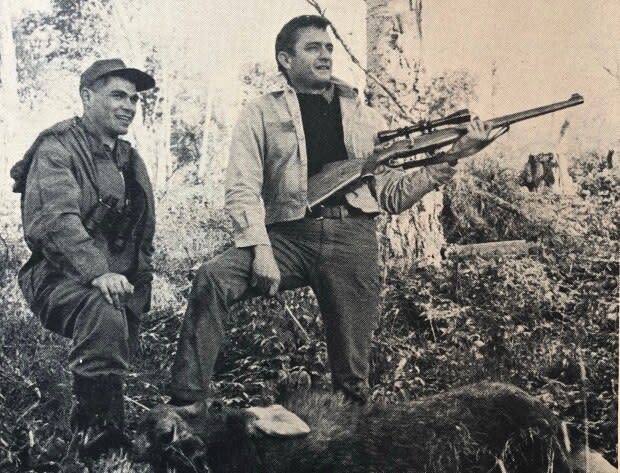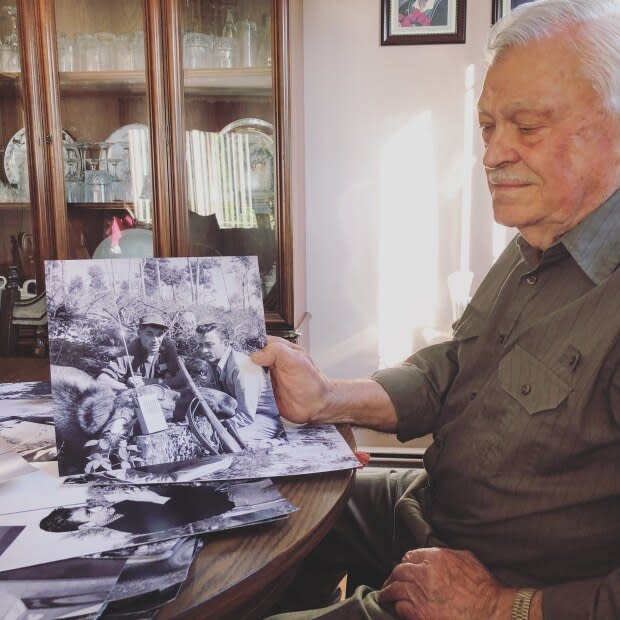Johnny Cash was 'a real good hunter,' says N.L. guide who took him hunting in 1961

Photos of Johnny Cash's moose hunting trip to Newfoundland have been widely shared for years, but the story itself is seldom told.
Heman Whalen, now 88, served as Cash's guide when the iconic singer-songwriter went hunting near Millertown in October 1961.
Whalen remembers the trip like it was yesterday.
"We were fortunate, I guess, in keeping it fairly quiet," Whalen said.
"But then on the other hand … when this trip took place, Johnny Cash wasn't as famous as he went on to be."
Generally if I'm alone it would take me 10 minutes to field dress a moose. It probably took Johnny Cash an hour. - Heman Whalen
Whalen is part of a team working to tell the story of Cash's trip to the province, after never-before-seen photos of the trip were uncovered by independent filmmaker Jonathan Holiff — son of Cash's former manager, Saul Holiff.
"Everyone thinks of Johnny Cash as sort of being a tremendous entertainer and a musician," Whalen told CBC's St. John's Morning Show. "However, I saw Johnny Cash as a real good hunter."
Whalen remembers meeting Cash for the first time: both men were 29 at the time, and Whalen said they instantly connected.
"He was in the station wagon, introduced himself, and I introduced myself. And from then on I would say we were the best of friends," he said.
"We went on to the cabin … We got in and settled away, had a meal. Then of course the guitars [were] out."

It didn't take long the next day for Cash to show his hunting skills, Whalen said.
"I was very anxious to see Johnny Cash get his moose first," Whalen said. "Once he got it, it took a little bit of a burden off my shoulders. About 20 minutes out of camp, he had a moose.
"I found out later that he was quite happy to get the much smaller moose, cause he was looking for the perfect meat," he added. "He wanted good eating meat, which is what he got. Generally if I'm alone it would take me 10 minutes to field dress a moose. It probably took Johnny Cash an hour."

Whalen remembers the chats he had with Cash, connecting on things like family life and how they grew up.
"Johnny Cash was a very family-minded person. He grew up doing what his mother told him and his father told him, that was his philosophy in life," Whalen said.
"He was a very ordinary person. He thought Newfoundland was a beautiful place … he had dreams of coming back again."
Whalen also remembered how the trip ended, calling it "a pleasure" to hunt with Cash.
"We agreed not to say goodbye, we agreed to say that we would get together again. We both underrated how much we enjoyed the trip," Whalen said. "We had a lot of admiration for each other."

Photos highlight key point in Cash's life: Holiff
Filmmaker Jonathan Holiff said his father, Saul Holiff, and Cash had just finished a 10-date tour in Ontario in May 1961 when they started talking about hunting.
"Cash was an excellent hunter. My father hated the idea of hunting, but hoping to impress Cash, he suggested they travel to Newfoundland and hunt and do a small tour," Holiff told CBC Newfoundland Morning.
It wasn't until years later that a stash of memories from the trip and the years Saul Holiff and Cash worked together were discovered.

Jonathan Holiff was living in Los Angeles, estranged from his father prior to his death in 2005. It was when he travelled to Victoria, B.C., to help care for his mother that he found a storage locker owned by his father — and a box simply labelled "Johnny Cash."
"It was really like finding a treasure," Holiff said.
According to Holiff, the storage locker contained more than 600 letters, 500 photographs, and 60 hours of audio diaries and recorded phone calls between Cash and Saul Holiff. The contents have been donated to the University of Victoria, who established a digital archive of the collection.
Holiff said the timing of the Newfoundland trip and the photos also holds significance in the evolution of Cash's career, as it was right around the time Cash began to battle addiction on the rise to superstar status.
"It was at exactly the moment in time where he started to miss concerts. The excuse was always, of course, laryngitis, but it was of course overdoing it on the pills," Holiff said.

"And unfortunately the next 10 years were a roller coaster ride. Ultimately, however, arriving at the end of the decade where he was on top, outselling The Beatles in North America."
Although the discovery of the photos helps to paint the life of Cash, Holiff said it has also helped him paint a better picture of his father, something he called a "cathartic experience."
"My father committed suicide, and he didn't leave a note," Holiff said. "Discovering this material … really helped me process my grief, as it were."
Holiff is working to create a short documentary using the material, and hopes to be able to bring an exhibit to the province in the near future — with stops in the communities Cash preformed in.
Read more from CBC Newfoundland and Labrador

